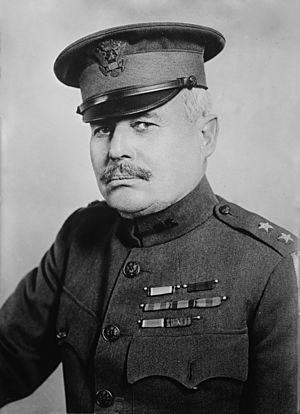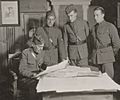Robert Alexander (United States Army officer) facts for kids
Quick facts for kids
Robert Alexander
|
|
|---|---|

Alexander in 1919
|
|
| Born | October 17, 1863 Baltimore, Maryland, US |
| Died | August 25, 1941 (aged 77) Manhattan, New York City, US |
| Place of Burial |
Arlington National Cemetery, United States
|
| Allegiance | |
| Service/ |
|
| Years of service | 1886–1927 |
| Rank | |
| Unit | |
| Commands held | 41st Division 63rd Brigade 77th Division |
| Battles/wars | World War I |
| Awards | Distinguished Service Cross, Croix de Guerre |
| Spouse(s) | Mollie Augur Alexander (nee Thomas) |
Major General Robert Alexander (October 17, 1863 – August 25, 1941) was a senior United States Army officer. He served in World War I, where he commanded the 77th Infantry Division on the Western Front.
Early life
Robert Alexander was born in Baltimore, Maryland, on October 17, 1863. His parents were Judge and Mrs. William Alexander. His father had been Justice of the Circuit Court of Baltimore City and the Court of Appeals of the State of Maryland.
Alexander studied law in the offices of J. B. and Edwin H. Brown in Centreville, Maryland. He attained admission to the bar, but decided against a legal career, instead enlisting in the United States Army's 4th Infantry Regiment as a private on April 7, 1886.
Career
In 1887, he became the first sergeant of his company, and in 1889 received a promotion to second lieutenant.
As he rose through the ranks he took part in the American Indian Wars, served in Puerto Rico during the Spanish–American War, and on the Texas–Mexico border during the Pancho Villa Expedition.
When the United States joined the Allied forces in World War I, Alexander proved his valor and was able to rise through the ranks. He was also given the responsibility of inspector general in the Zone of Communications from November 1917 to February 1918. Alexander was promoted to brigadier general in February 1918 and then to major general in August 1918.
From the headquarters of the 77th Division in France, Alexander was one of the officers who reported on the Lost Battalion incident. A group of around 500 soldiers, in nine companies, had disappeared after going into the Argonne Forest expecting American and French Allied troops to meet them. This had followed an American attack on German forces and, with Major Charles White Whittlesey leading the group, the men found that the French troops had been stalled. As a result, the battalion was cut off by the Germans who surprised them and suffered large losses with only 197 men coming out of the ravine. In the report he states:
"General Order Number 30:
I desire to publish to the command an official recognition of the valor and extraordinary heroism in action of the officers and enlisted men of the following organizations: Companies A, B, C, E, G, H 308th Infantry Company K 307th Infantry Companies C, D 306th Machine Gun Btln. These organizations, or detachments therefrom, comprised the approximate force of 550 men under command of Major Charles W. Whittlesey, which was cut off from the remainder of the Seventy-Seventh Division and surrounded by a superior number of the enemy near Charlevaux, in the Forest d'Argonne, from the morning of October 3, 1918, to the night of October 7, 1918. Without food for more than one hundred hours, harassed continuously by machine gun, rifle, trench mortar and grenade fire, Major Whittlesey's command, with undaunted spirit and magnificent courage, successfully met and repulsed daily violent attacks by the enemy. They held the position which had been reached by supreme efforts, under orders received for an advance, until communication was re-established with friendly troops. When relief finally came, approximately 194 officers and men were able to walk out of the position. Officers and men killed numbered 107. On the fourth day a written proposition to surrender received from the Germans was treated with the contempt which it deserved. The officers and men of these organizations during these five days of isolation continually gave unquestionable proof of extraordinary heroism and demonstrated the high standard and ideals of the United States Army.
Robert Alexander, Major General, US Army Commanding" April 15, 1919
In France, he commanded the 41st Infantry Division, 63rd Infantry Brigade, and 77th Infantry Division.
After the war, he returned to the rank of colonel and commanded the 3rd Field Artillery Brigade.
In 1919, Alexander received the honorary degree of LL.D. from St. John's College of Annapolis, Maryland.
He retired in 1927 at the rank of major general.
He authored a memoir, 1931's Memories of the World War, 1917–1918. Also in 1931, Alexander received an honorary LL.D. from the College of Puget Sound.
Personal life
He married Mollie Augur Thomas (1871–1953), who was the daughter of Brigadier General Earl D. Thomas in 1892. Together, they had two sons: William Dennison (1893–1978) and Robert (1900–1979). William Dennison became a colonel and Robert Jr. became a lieutenant colonel of the United States Army and died within one year of each other. He was a freemason.
He died in Manhattan on August 25, 1941, and is buried at Arlington National Cemetery, in Arlington, Virginia.
Awards
- Distinguished Service Cross for heroism at Grandpré, Ardennes in October, 1918.
- Croix de Guerre, two citations
- Commandeur of the Legion of Honour
Ranks and commissions
- Private and Sergeant, Company G, 4th United States Infantry, April 7, 1886 – January 29, 1890
- Second Lieutenant, 7th United States Infantry, December 17, 1889
- First Lieutenant, 12th United States Infantry, January 7, 1897
- Transferred to the 11th United States Infantry, March 21, 1898
- Captain, 14th United States Infantry, October 2, 1899
- Transferred to the 11th United States Infantry, February 17, 1900
Images for kids


